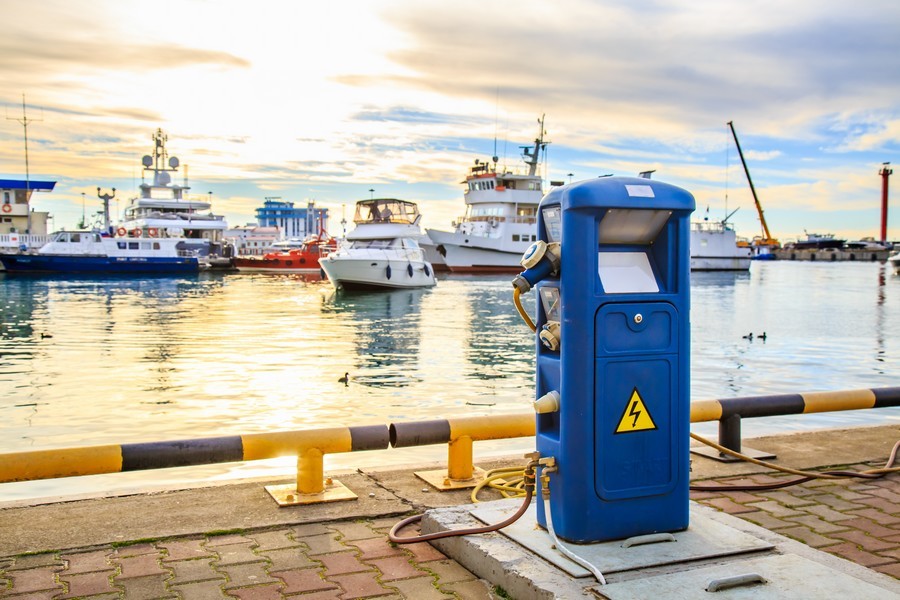Commercial marine and navy: 5 criteria to take into account when choosing a battery charger

Regulations, installation constraints, quality of components... Many elements must be taken into account when choosing a battery charger, especially in the marine commercial and navy. Subject to important constraints and strict standards, this sector requires special precautions. What are the criteria to take into account when choosing a battery charger for a marine commercial or naval vessels? Answers.
Commercial and naval vessels, specificities
The main difference between the marine commercial and recreational boat is the time the boats are used. While in the leisure marine, the boat is used on average 15 days per year, the professional boat sails about 180 days per year. A product for professional use will therefore be much more heavily used than a product for recreational use. The choice of equipment installed on board must therefore be made according to this specificity, including battery chargers.
Read also: Marine battery charger: everything you need to know
Marine commercial and navy vessels: what criteria should you take into account when choosing your battery charger?
1. The reliability of the battery charger
When the battery charger breaks down, the boat is immobilized. In the case of a pleasure boat, the consequences are less serious. In the case of commercial boats, however, any downtime due to a failure means an interruption of operation. The equipment installed on board commercial vessels must therefore be extremely reliable and durable to avoid breakdowns. So make sure you choose a battery charger that is known for its reliability. Also, make sure that the charger operates at full power even in high temperatures. If the power output decreases as soon as the operating temperature reaches 40°C, for example, you will lose efficiency, in addition to risking the premature deterioration of your equipment.
Read also: Battery charger: how to operate at full power despite high temperatures?
2. The ability to handle breakdowns
If opting for a reliable battery charger helps minimize breakdowns, there is no such thing as zero risk. It is therefore important to consider this possibility and to anticipate the capacity of the battery charger supplier to replace the product if necessary. Beyond this aspect, and even more important, is the criterion of redundancy. In the event of a breakdown while the boat is in use, it is essential to have a second piece of equipment on board the boat capable of taking over automatically.
3. The number of battery chargers required, according to the regulations
The regulations impose different installation standards for recreational and commercial use. On a commercial vessel, several battery banks are usually installed, each one being intended for a specific use: powering the main engines, generators, communication systems... The regulations require a dedicated battery charger for each battery bank. It is therefore out of the question to opt for a single charger which, with its multiple outputs, would charge the different battery banks.
4. Communication between electronic equipment
Another selection criterion: the product must be able to communicate and interface with the other equipment on the boat. The communication between the different devices must be simple, and not require a gateway.
5. Electromagnetic compatibility
It is essential that the battery charger is silent from an EMC (electro-magnetic compatibility) point of view. In the professional civil and military navy, communication is generally by radio. The devices installed on board the ship must therefore not generate any interference with the communication and navigation equipment.

Equipment certification, an essential criterion for professional civilian and military navies
Perhaps the most important criterion to help you choose your battery charger is device certification. The standards that apply to the marine commercial or military vessel are particularly demanding, so product certification is an excellent guarantee. The certification of a battery charger by a recognized organization (DNVGL, Bureau Veritas or others) guarantees that the device has passed - with success - a whole series of tests: thermal heat dissipation, vibration resistance, EMC... The durability and intrinsic qualities of the device are analyzed with a fine-tooth comb. This certificate assures you that the battery charger you choose is perfectly suited for professional operations.
Read also: DNV GL certification: what is it and why is it important?
As a marine specialist, Dolphin Charger has designed a range of battery chargers specially adapted to the specificities of professional civilian and military marine operations. The Pro HD+ range perfectly meets the severe constraints of use: high temperatures, electromagnetic compatibility, communication with other equipment... Dolphin Charger is committed to developing quality products, recognized for their reliability and DNVGL certified, to support professionals. Discover our Pro HD+ battery chargers!


